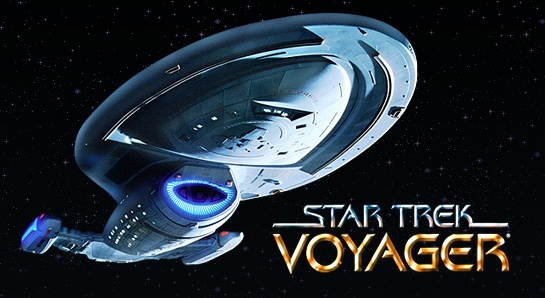Recently I’ve been re-watching my least favorite Star Trek show, Voyager. In part because it’s the last of the series’ that I haven’t watched again and in part I’m a glutton for punishment.
I’ve realized what it is about the show that I dislike so much. It doesn’t have a moral center. Most good sci-fi, and especially all the other Treks, have taken the opportunity to comment on ideas of morality, society and contemporary issues. Not that every episode was a comment, per se, but that there was a sense of gravitas and moral center of the show in the characters.
In The Original Series (TOS) that could, variously, be Kirk, Spock and/or McCoy. Due to the interactions of ‘The Big Three’ or ‘Triumvirate’ the show could comment about such diverse topics as the Vietnam War, racism, sexism, drug use and loads of other things. Social commentary was what made Star Trek stand out among its peers — how much veiled discussion of Vietnam does Lost In Space take on?
For The Next Generation (TNG) the moral core was Picard, whose almost strict adherence to Starfleet’s Prime Directive could be considered a commentary on non-interference and/or American culture. But in some episodes Worf — the bristly Klingon warrior — and even Data — the machine wanting to become a man, a modern-day Pinocchio — took the reigns. Indeed, one of the best episodes of the first three seasons, ‘The Measure of A Man’, S2.E9, centered on Data, his identity and humanity’s role in slavery. Plenty of other episodes throughout its run had morality questions as a central issue. I remember that’s what first drew me into the show and part of the reason I studied Philosophy as an undergrad.
Though often considered the darkest, most un-Roddenberry like show, Deep Space 9 (DS9) dealt with the struggles between science and religion, religious strife, war, freedom fighters or terrorists and xenophobia. More than 20 years after it first aired the show could still reflect today’s problems. Again, the captain, Sisko, was often the focal point of moral quandaries, but the supporting cast, especially Dax, Kira and O’Brian, had their own excellent episodes. I would even argue that it was because of its darker aspects that allowed DS9 to have a lasting impact. If TOS and TNG were the best of what humanity could be in overcoming its baser instincts, DS9 was more reflective of what humanity actually is.
There wasn’t a lot of social commentary in either of the first two seasons of Enterprise, but seasons three and four of the show really hit their stride regarding commentary. Indeed, the whole third season plot arc of an attack on Earth/humanity demanding a swift response against the aggressors really reflected post-9/11 American culture and paranoia.
Yet Voyager has not even tried to reflect society. It aired from 1995 to 2001 so there were plenty of issues it could have tackled. In that time there were domestic and international instances of violence and terrorism — the Atlanta Olympic bombing, Columbine, the Northern Ireland troubles and all that happened in the area once known as Yugoslavia. There were scandals in the highest halls of power — Clinton was impeached, after all — that could have led to at least one story line. And there were huge advances in technology, like the widespread use of the internet, widespread use of cell phones, Mars landings and the tech bubble. The timeframe was ripe for analysis.
Why could DS9, which aired from 1993 to 1999, so almost completely contemporaneously, have much more social commentary? Was it the writers and producers for Voyager who became hesitant? It certainly wasn’t the acting chops of lead Kate Mulgrew, played Captain Janeway and who later went on to more great acclaim as Red in Orange Is the New Black. The character she plays in Voyager, however, just doesn’t have the same gravitas or moral authority as any other Trek captain. Her character just doesn’t have any deep set, grand philosophies by which she abides. What she defends in one episode — such as the Prime Directive — is completely disregarded in the next. When given multiple opportunities to get her crew home — ostensibly her main role as captain on the show — she ignores them. Should could have asked Q on multiple occasions, but chose to ‘go the hard way’. What kind of moral center does she have?
The rest of the Voyager crew seems content to go along with her incompetence by never having a mutiny or questioning her orders. The First Officer, Chakotay, spent his adult life as a member of the rebellious Maquis, yet is her biggest supporter. Former convict Tom Paris never wanted to strike out on his own, instead trusting the questionable orders Janeway gives.
I understand the whole dynamic of the show would have changed if they would have returned before the final episode, so some of it was ‘dramatic license’. But she was just a horrible captain. There were good (by Voyager terms) episodes that dealt with time travel, alternate reality or false identity — true sci-fi staples. There were lots of action sequences, too. The show basically has the same problem as the latest movie — a good action series with hints of sci-fi but without the cornerstones of Star Trek.
Bryan Fuller, who helped develop the new show Discovery but who apparently won’t be involved any longer, got his first major start writing for Voyager. Hopefully he learned from the mistakes of the show and imbued his new show and showrunners with the need to not only tell compelling stories, but to have them mean something.


Pingback: Morality TV | Collin Lieberg